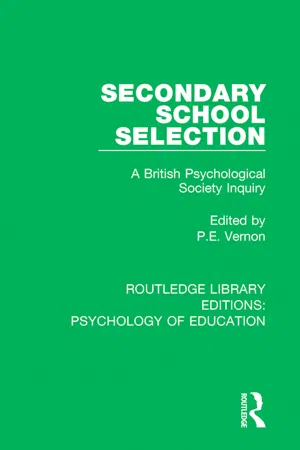
- 218 pages
- English
- ePUB (mobile friendly)
- Available on iOS & Android
About This Book
Selection for secondary education at 11-plus still arouses widespread controversy; and the psychological techniques which are employed, such as intelligence and attainments tests, are often criticised. Originally published in 1957, under the auspices of the British Psychological Society, a group of psychologists, experienced in this field, tried to present a balanced survey of the situation at the time. They show that the real problems of secondary schooling cannot be solved by simple administrative changes; they arise from historical causes, from the class structure of English society and the educational and vocational ambitions of parents. Psychology has studied the development and differentiation of children's abilities and interests with age, and thus throws light on the need for, and the consequences of, streaming children in different classes or schools, and the value of alternative systems such as the comprehensive school. Selection at 11-plus, it is admitted, does have harmful effects on teaching in the junior school and produces much emotional strain, though these effects are often exaggerated. It was, in fact, accurate for some ninety per cent of children; yet the implications of its inevitable inaccuracy for some pupils cannot be ignored. The functions, and the value, of intelligence and attainments tests and the essay are examined, and full consideration given to the use of teachers' estimates of suitability and other techniques. The Report is addressed primarily to teachers, educational administrator, and psychologists – that is people with some background knowledge of the problems involved; but it should also be intelligible and helpful to the educated layman, since the more technical details are confined to Appendices.
Frequently asked questions
Information
Index
Table of contents
- Cover
- Half Title
- Title Page
- Copyright Page
- Table of Contents
- Preface
- I. The Background of Selection
- II. History and Survey of Present Procedures
- III. General Considerations
- IV. Effects of Selection
- V. The Validity of Selection
- VI. Intelligence Tests
- VII. The Measurement of Attainment
- VIII. The Use of Primary School Marks and Teachers’ Estimates
- IX. Other Techniques used in Selection for Technical Education and in Consideration of Border-zone Cases
- X. Summary and Recommendations
- A. Follow-up Studies of the Validity of Selection
- B. The Constancy of the I.Q.
- C. The Reliability of Scaling of Primary School Marks and Estimates
- D. Specimen Techniques of Scaling
- Bibliography
- Index